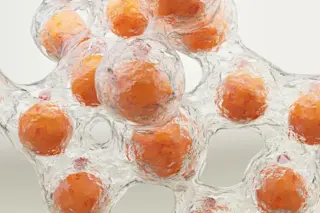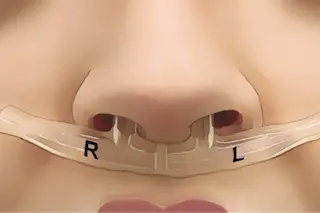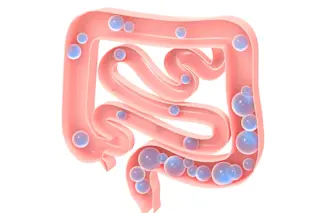When pigs are penned in close quarters, some become so irritable they savage their pen mates’ ears and tails, a problem farmers call ear-and-tail-biting syndrome. David Hardy, a Canadian hog-feed salesman from the farmlands of southern Alberta, knew that behavior well. Years of experience had taught him something else: All it takes to calm disturbed pigs down is a good dose of vitamins and minerals in their feed.
That came to Hardy’s mind one November evening in 1995 when an acquaintance, Tony Stephan, began confiding his troubles. His wife, Deborah, had killed herself the year before after struggling with manic depression and losing her father to suicide. Now two of his 10 children seemed headed down the same road: Twenty-two-year-old Autumn was in a psychiatric hospital and 15-year-old Joseph had become angry and aggressive. He had been diagnosed as bipolar, a term for manic depression, but even with medication he was prone to outbursts so violent that the rest of the family feared for their lives.
The boy’s irritability sounded familiar to Hardy. I don’t know a whole lot about mental illness, Hardy told Stephan, but I’ve seen similar behavior in the hog barn, and it’s easy to cure.
So the two men set out to create a human version of Hardy’s pig formula. They bought bottles of vitamins and minerals from local health-food stores and spent nights at Stephan’s kitchen table concocting a mixture. On January 20, 1996, they gave Joseph the first bitter-tasting dose. Within a few days, Joseph felt better than he had in months. After 30 days, all the symptoms of his illness were gone.
Stephan next turned to Autumn, whose mental state had been steadily deteriorating for years. Now she was psychotic, convinced she had a gaping hole in her chest from which demons emerged. Just released from the hospital where she’d been on suicide watch, Autumn required 24-hour supervision to ensure she didn’t hurt either herself or her 3-year-old son.
Stephan forced her to take the nutritional formula. After just two days of treatment, her rapid swings between mania and depression stopped. After four days her hallucinations vanished. “I remember saying, ‘Oh my gosh, my hole is gone,’ ” she recalls. By week’s end, she felt well enough to quit all but one of her five medications.
Nine years later, both Autumn and Joseph remain symptom free, medication free, and devoted to taking what they call “the nutrients” each day. Autumn Stringam, her married name, is an articulate woman with bright eyes who revels in being a full-time mother to her son and the three daughters she’s had since getting well. “I don’t feel I’m cured,” she says. “I feel I’ve got something that allows me to manage and have a normal, functional life—maybe even better than functional.”
It’s easy to write off the Stephans’ treatment as just one more crackpot cure in a field rife with fraud and false hope. The supplement they took has yet to be proved in large clinical trials, while scientists who have studied it have been caught in the cross fire between converts, willing to take the supplement on faith and anecdotal evidence alone, and skeptics who look askance at all alternative medicine. Yet the idea of treating mental disorders with supplements makes sense, experts in the field say. Micronutrients help build and sustain the brain’s architecture and fuel its biochemistry. They are critical in countless ways to the working of cells throughout the body, including the brain. “We need 40 essential micronutrients in our diet—vitamins, minerals, and essential fatty acids,” says Bruce Ames, a biochemist at the Children’s Hospital Oakland Research Institute. Ames has explored the impact of zinc and iron on brain cells. “If you don’t have enough of one, you’re fouling up your biochemistry.”
A number of diseases caused by nutrient deficiency, such as scurvy, beriberi, pellagra, and pernicious anemia, display psychiatric symptoms like irritability and depression. But while severe deficiencies are rare in the developed world—when’s the last time you met someone with beriberi?—many of us fall short of getting all the nutrients we need. In 1997 a British study compared the mineral content of fruits and vegetables grown in the 1930s with the mineral content of produce grown in the 1980s. It found that several nutrients had dropped dramatically, including calcium (down nearly 30 percent), iron (down 32 percent), and magnesium (down 21 percent).
Some researchers suspect that even mild deficiencies can affect the psyche long before any physical symptoms appear. Stephen Schoenthaler, a sociologist at California State University at Stanislaus, has been exploring the link between nutrients and mental health by giving basic vitamin and mineral supplements to prison inmates and juvenile detainees. Again and again, since the early 1980s, Schoenthaler has found that when inmate nutrition improves, the number of fights, infractions, and other antisocial behavior drops by about 40 percent. In each case, he has found, the calmer atmosphere can be traced to the mellower moods of just a few hotheads. The inmates most likely to throw a punch, he has discovered, are the ones with the least nutritious diets and the lowest levels of critical nutrients.
Schoenthaler’s findings have been undermined by less than sterling research methods: His papers have failed to describe the precise methods by which he analyzed the inmates’ blood. (In January, a committee at his university recommended that he be suspended for a semester without pay for academic and scientific misconduct in later, unrelated research.) So in the late 1990s, an Oxford University physiologist named Bernard Gesch decided to put the theories to a more rigorous test. Gesch divided 231 prisoners in one of Britain’s toughest prisons into two groups. Half were given a standard vitamin and mineral supplement each day as well as fish-oil capsules and omega-6 oil from evening primrose. The other half received placebos. The results, published in 2002 in The British Journal of Psychiatry, drew headlines on both sides of the Atlantic. They were also almost identical to Schoenthaler’s. Over the course of approximately nine months, inmates taking supplements committed about 35 percent fewer antisocial acts than the group taking placebos. A few weeks after the study started, the prison warden told Gesch that the administrative report that month showed no violent incidents had occurred. “As far as he was aware, this had never happened in the history of the institution,” Gesch says.
Poor Man’s Pharmacopoeia
A number of common nutrients may help alleviate mental illness when taken in higher-than-normal doses. A few of the most promising candidates follow.
Folic acid: Folic acid is a B vitamin essential to mood regulation and the development of the nervous system. Patients deficient in it appear to respond poorly to antidepressants. In one 2000 British study, 127 patients taking Prozac were also given either 500 micrograms of folic acid a day or a placebo. The folic acid group did significantly better, in particular the women, 94 percent of whom improved compared with 61 percent in the placebo group.
Magnesium: It’s long been known that magnesium can act as a sedative. Some studies have also found magnesium deficiencies in patients with depression, although the evidence is inconsistent. The mineral may help other mood-stabilizing drugs work better. Researchers at the Chemical Abuse Centers in Boardman, Ohio, found that combining magnesium oxide with the drug verapamil helped control manic symptoms in patients better than a drug-placebo combination.
Chromium: Several studies have suggested that chromium picolinate may help alleviate depression and improve the response to antidepressants. In one small trial at Duke University, 70 percent of the patients who were given chromium picolinate improved, while none of those given placebos got better.
Inositol: This sugar molecule appears to make the brain’s receptors more sensitive to serotonin, one of the chemical messengers that mediate mood. In a series of short-term placebo-controlled trials, researchers at Ben Gurion University of the Negev in Israel found that large doses of inositol—12 to 18 grams a day—helped alleviate depression, panic disorder, and obsessive-compulsive disorder.
The study of micronutrients and mental health is known as orthomolecular psychiatry, a term coined by two-time Nobel laureate Linus Pauling in a controversial 1968 essay. Pauling wrote that nutritional supplements, unlike psychotherapy or drugs, represent a way to provide “the optimum molecular environment for the mind.” Varying the concentrations of substances normally present in the human body, he wrote, may control mental disease even better than conventional treatments.
Today the Society for Orthomolecular Health Medicine counts about 200 American members. One of the foremost practitioners, the Canadian psychiatrist Abram Hoffer, claims to have successfully treated thousands of schizophrenics with massive doses of vitamin C and niacin. He contends the vitamins neutralize an oxidized compound that causes hallucinations when it accumulates in the brains of patients. Until recently, such treatments thrived on the power of patient lore, not scientific certainty. Nutritional therapists were generally unwilling to test their claims in well-designed controlled studies. “Even when studies were done, they just didn’t meet the standards of rigor that would make them be taken seriously,” says Charles Popper, a Harvard University psychopharmacologist who studies bipolar disorder.
In 1973 a task force of the American Psychiatric Association issued a withering indictment of orthomolecular psychiatry, concluding that “the credibility of the megavitamin proponents is low.” For the next two decades, funding for orthomolecular research was rare. Academia turned its back on the field, and industry saw no profit in it—vitamins and minerals can’t be patented like other medicines. In recent years, however, grants from the National Center for Complementary and Alternative Medicine, founded in 1998, and new discoveries in brain biochemistry have prompted researchers to take a second look at nutritional therapies. The strongest evidence to date involves omega-3 fatty acids, a group of compounds abundant in fish oil of the kind Gesch gave to prisoners, as well as in the membranes of and synapses between brain cells. In a landmark 1999 study, Harvard psychiatrist Andrew Stoll found that bipolar patients who were given large doses of omega-3s did significantly better and resisted relapse longer than a matched group of patients who were given placebos.
Stoll’s findings have yet to be replicated, but other researchers have since studied omega-3s as a treatment for depression, schizophrenia, borderline personality disorder, and attention deficit hyperactivity disorder, or ADHD. (See “Fish Therapy,” opposite page.) “In every case, the data has been overwhelmingly positive,” Stoll says. Other research has shown correlations between low levels of various nutrients—zinc, calcium, magnesium, and B vitamins—and depression. Researchers have found that anywhere from 15 percent to 38 percent of psychiatric patients have reduced levels of folate. A 2000 study of older women found that 17 percent of those who were mildly depressed and 27 percent of those suffering severe depression were short on vitamin B12.
In an effort to winnow out confounding variables, nutritional research has long focused on single nutrients. Yet some researchers, like Stoll, have suggested that the effects of nutrients are additive—that their real strength becomes apparent only in a multinutrient formula. A formula much like the one that Tony Stephan and David Hardy first stumbled upon in a hog barn.
After Stephan and Hardy’s success, they spread word of the treatment among fellow Mormons in southern Alberta. They began by whipping up batches of the formula for church members suffering all sorts of disorders, from mild depression to ADHD to schizophrenia. Then, in early 1997, they quit their jobs and began selling the formula, which they eventually named EMPowerplus (the EM stands for “essential mineral”). Their company, Truehope Nutritional Support, employs 35 people in a squat building on the edge of Hardy’s hometown, the tiny farm community of Raymond.
Stephan, 52, is stocky and energetic, with blondish-gray hair, earnest blue eyes, and a nose that skews slightly to the right as if it had been broken. Hardy, 55, is tall and lean, with square wire-rimmed glasses. It’s not hard to see him as the high school science teacher he once was. The two relate the story of their supplement with a practiced air. Both are devout Mormons who seem to believe they’ve been given a mission to alleviate mental illness. Although the supplement is not inexpensive—a month’s supply costs $69.98—Stephan and Hardy say it is expensive to manufacture, and the business barely turns a profit.
For years, they say, they tinkered with the formula, using Autumn as their guinea pig. “A lot of it was trial and error,” Stephan says. “There’s nothing out there saying that if you’re bipolar you need 50 milligrams of zinc.” The latest incarnation of the supplement contains 36 vitamins, minerals, amino acids, and antioxidants. Most are the same ingredients found in a typical multivitamin but at much higher doses. For example, a daily dose of the supplement contains a whopping 120 milligrams of vitamin E, six times the recommended daily allowance. So far, the only side effects appear to be nausea and diarrhea, but no one really knows the long-term dangers of taking high vitamin and mineral doses.
News of the supplement has spread quickly through the Internet and patient support groups. Hardy says at least 6,000 people have used the supplement for psychiatric problems, and a few thousand more have tried it for other central nervous system disorders such as multiple sclerosis, Parkinson’s disease, cerebral palsy, and stress. Like many alternative therapies, the supplement has generated tales of dramatic results, but Stephan and Hardy know that they need solid research to prove its effects.
Several years ago, they began contacting scientists, including Bonnie Kaplan, a research psychologist at the University of Calgary, and Harvard’s Charles Popper, inviting them to study their mixture. The scientists had essentially the same response. “I told them to take their snake oils somewhere else,” as Kaplan later recalled to a reporter. Popper was so leery of the pair after his first meeting that he hid the bottle of the supplement they gave him under his coat as he walked back to his office: “I was afraid someone was going to see me with the stuff.”
Kaplan finally agreed to meet with Hardy and Stephan in 1996. Impressed by their sincerity, she decided to offer the formula to a handful of patients who had not responded to conventional treatments. Kaplan first tried the supplement on two boys with wildly shifting moods and explosive tempers. One was so obsessed with violent fantasies that he could not go more than 20 seconds without thinking about guns. After he started taking the supplement, Kaplan later wrote in a case study, his obsessions and his explosive rage diminished. When he quit the supplements, the obsessions and anger returned. Back on the supplements again, the symptoms retreated.
Those results were encouraging enough that within a few months Kaplan started a small clinical study of 11 bipolar patients who had not been able to control their illness with conventional medications. After six months of treatment, each of the 11 showed improvement in both their depression and mania. Most were able to cut down on their medications, and some quit using them altogether.
In 2000 Kaplan accompanied Hardy and Stephan to Harvard’s McLean Hospital to talk with other scientists. Popper was skeptical, despite Kaplan’s credentials. That night, however, he got a call from a colleague whose son had suddenly developed bipolar disorder and was throwing violent tantrums daily. Popper reluctantly offered him the sample bottle of the supplement that Hardy and Stephan had given him, figuring it couldn’t hurt. He did not believe it would help. Four days later, the father called to tell him the tantrums were gone. “The kid wasn’t even irritable,” Popper recalls. “We don’t have anything in psychiatry that can do that.”
Fish therapy Omega-3s are a family of fatty acids found in seafood and certain plants such as flax. Researchers are interested in their therapeutic potential for several reasons: Large population studies have shown a correlation between rates of seafood consumption and depression. Small studies have found patients with depression have reduced levels of these fatty acids in their blood. A variety of small clinical trials have also suggested that omega-3s (at doses ranging from one to four grams) may alleviate the symptoms of depression, schizophrenia, and bipolar disorder, as well as improve patients’ response to conventional medicines.
Some researchers speculate that fatty acids help maintain fluidity in the cellular membranes, allowing neural receptors to better detect incoming signals. Others, like Harvard psychiatrist Andrew Stoll, believe that omega-3s affect the brain in ways similar to mood-stabilizing drugs like lithium and Depakote: They tamp down excessive signaling between cells. Stoll says the compounds also reduce cellular inflammation—common in people with mental disorders—stirred up by omega-6s, another family of fatty acids. In centuries past, humans ate a great deal of wild game, greens, and other foods rich in omega-3s. Today we eat fewer omega-3s, while filling up on foods heavy with processed vegetable oils, which are high in omega-6s. The change may help account for the increased incidence of depression in the past 100 years, Stoll says.
Stoll’s colleagues say that the compounds show promise but require further research. “The problem is there’s not a lot of published evidence yet,” says Harvard psychiatrist David Mischoulon. “So it’s hard to compare this modest body of evidence against evidence for a medication like Prozac or Zoloft that has numerous studies to back it up.” —S.F.
Like Kaplan, Popper gradually began giving the formula to bipolar patients who had not done well on psychotropic drugs. The supplement not only worked for 80 percent of the patients, it also took effect far more quickly than conventional drugs for many of them. After testing the supplement for six months and seeing improvements in some two dozen patients, Popper decided he had something noteworthy enough to share with colleagues. In 2001 he and Kaplan each published articles in The Journal of Clinical Psychiatry describing their findings and encouraging further research. “What if some psychiatric patients could be treated with inexpensive vitamins and minerals rather than expensive patented pharmaceuticals?” Popper wrote. It was a strikingly optimistic statement about a discredited idea. “I knew going public would raise a lot of eyebrows, that I was putting my career on the line,” Popper says. “But I was convinced.”
One reason that orthomolecular psychiatry was treated with such derision in the 1960s and early ’70s was that biologists had only a faint understanding of the physical effects that nutrients had on the brain. In the past two decades, however, researchers have begun to gain a better understanding of the brain’s biochemical machinery. Psychiatrists now know that nutrients are the brain’s backstage crew, endlessly constructing and maintaining cellular set designs, directing players to their marks. They also play important roles in the creation of chemical messengers thought to mediate mood, such as serotonin, dopamine, and norepinephrine. Zinc is a particularly versatile player, involved in more than 300 enzymatic reactions; when zinc goes missing, a cell’s DNA and its repair machinery can be damaged.
Neuroscientist Bryan Kolb, at the Canadian Centre for Behavioural Neuroscience in Lethbridge, Alberta, has explored how brain cells are affected by drugs, hormones, and injury. When Stephan and Hardy first approached him in 1997, he politely declined to start up a study. He had little psychiatric expertise, he explained, and his usual experimental subjects had four legs and long tails.
Two years ago, Kolb decided to take another look. In an effort to tease out a biochemical pathway that might account for the clinical effects that Kaplan, Popper, and others had described, he ran a series of rat studies. First, he inflicted injuries in two parts of infant rats’ brains: the frontal lobe, which controls motor function and the ability to plan and execute tasks, and the parietal lobe, which influences spatial functions. Half the group then got a diet spiked with a supplement similar to EMPowerplus and half got plain rat chow. When Kolb put them through a series of cognitive and spatial-ability tests, the vitamin-charged rats did markedly better than the control group.
Kolb noticed something else about the supplement-fed rats: “They were unbelievably calm.” Lab rats usually flinch and squeal when identification tags are stapled onto their ears, he says. “These rats acted like nothing had happened.” Kolb then autopsied the rats’ brains: The formula-fed rats had bigger brains than the chow-fed rats. In areas near where he’d inflicted lesions, the dendrites of the existing cells—the long, tentacled parts of neurons that conduct electrical impulses—had sprouted new branches, each ending with hundreds of new synapses. (In an earlier study, Kolb had found that the amino acid choline could also stimulate dendritic growth. But the results weren’t as pronounced.)
Kolb can’t say if such neural connections could alleviate mental illness. Schizophrenia may be associated with structural abnormalities in the brain, but so far that’s not thought to be the case in mood disorders like depression or bipolar disorder. Whatever the mechanism, Kolb says, he’s persuaded that “the diet can clearly alter brain function.”
Of course, not everyone with a vitamin deficiency grows violent or sinks into a clinical depression. So why might a nutritional supplement help only some people? Kaplan has a possible explanation: Some of us have “inborn errors of metabolism.” We are born with unusual nutritional requirements that can affect our mental function. Mental illness appears to be partly heritable (bipolar disorder, for one, runs in families), yet no one has discovered a gene for the disease. Perhaps, Kaplan speculates, what’s passed down is a gene that affects the metabolic pathways influenced by various nutrients. Some people may simply inherit a metabolism that demands higher-than-normal amounts of vitamins and minerals. “What’s optimal for me may not be optimal for someone with a mental illness,” Kaplan said at a meeting of the American Psychiatric Association in 2003. “I’ve been blessed with a stable mood, and I could probably eat a terrible diet and not have any problems. Others may need additional supplementation.”
The next research step should be a controlled randomized trial of how bipolar patients taking supplements fare compared with those taking a placebo. Such studies are the gold standard for testing drugs and supplements. But Kaplan and Popper’s efforts have been stalled by controversy. The two scientists have been under attack by a group led by Terry Polevoy, a dermatologist in Kitchener, Ontario, who runs a Web site called HealthWatcher.net. A onetime devotee of holistic therapies, Polevoy now crusades against alternative treatments he considers scams. For the past four years, he and his colleagues have accused Stephan and Hardy of irresponsibly marketing an unproven remedy. The employees that take the company’s orders have no medical training, Polevoy points out, yet they’re told to encourage customers, many of them mentally ill, to stop using traditional medicines and rely exclusively on the supplement. “People have been injured by taking this stuff,” Polevoy says. In one well-publicized case, a schizophrenic man quit his medications in order to take the supplement and wound up psychotic, in jail, and facing assault charges.
Hardy and Stephan, in turn, accuse Polevoy of being a front man for the pharmaceutical industry, a charge Polevoy denies. “I may go to a few meetings a year hosted by pharmaceutical companies,” Polevoy says, “but I’m not paid.”
After Kaplan and Popper published accounts of their experiences with the formula, Polevoy charged the scientists with conducting experimental research on patients without proper institutional review. The allegations triggered lengthy investigations by the scientists’ academic institutions, as well as by Canadian and U.S. health authorities. Kaplan and Popper were ultimately cleared of any improprieties, but the ordeal left both so gun shy that they stopped talking publicly about the supplement. (Kaplan declined to be interviewed for this story. Neither she nor any of the other scientists mentioned in this story have any financial ties to the supplement.)
Both scientists have had a tough time securing government support for their psychiatric research. EMPowerplus has yet to be approved for sale in Canada, and Health Canada, the agency that regulates food and drugs in that country, has sued Truehope for advertising the product to Canadians who might wish to import it. “The manufacturer has not provided us with scientific evidence that the drug is safe and effective,” says Jirina Vlk, a spokeswoman for the agency. Hardy and Stephan, in turn, have sued Health Canada for blocking shipments at the border. Health Canada initially denied Kaplan permission to pursue a randomized study of the supplement in 100 bipolar patients, although Kaplan already had funding from the Alberta government. That decision was reversed in 2004, after the agency established a new division dedicated to overseeing supplements and natural health products.
Meanwhile in the United States, Popper and Kaplan recently secured approval from the Food and Drug Administration to conduct an even larger clinical study of the supplement. Other scientists think this is long overdue. “It’s something that needs to be investigated,” says L. Eugene Arnold, a psychiatrist at Ohio State University who plans to explore the use of zinc to treat ADHD. “There’s no point in people arguing about whether it works or not without getting some data to get the answer.” Arnold is no advocate of alternative treatments for mood disorders, but he thinks it’s reasonable to suspect that vitamins and minerals might have an effect. The standard treatment for bipolar disorder is lithium, he points out. “And what is that but a mineral?”
For Hardy and Stephan, the long wait for scientific validation has been frustrating. But they are patient. “It’s like any new discovery—acceptance is slow to come,” Stephan says. “But that will change. It will come.”














